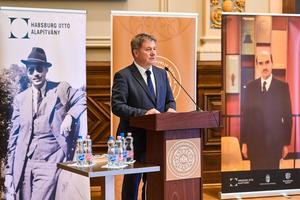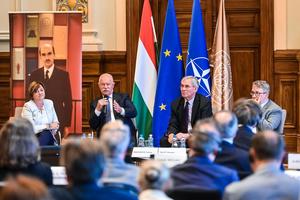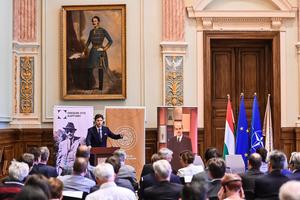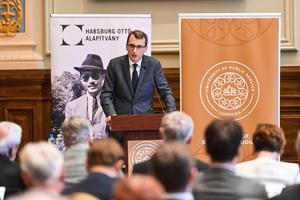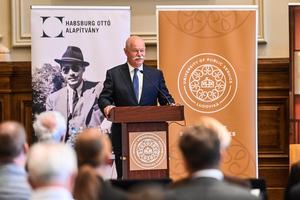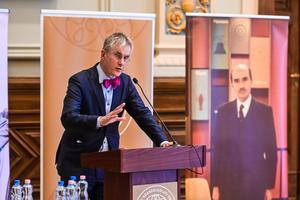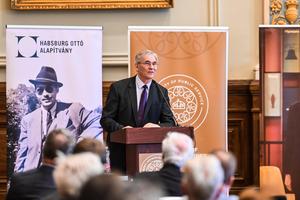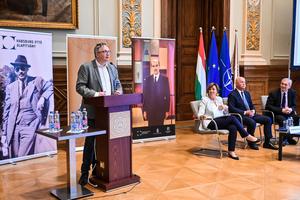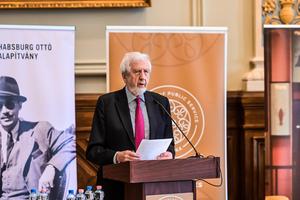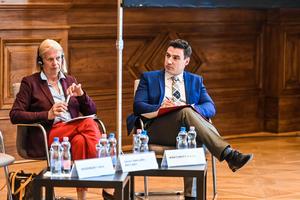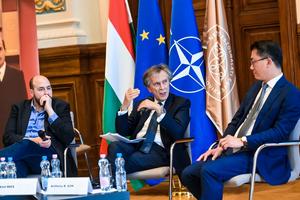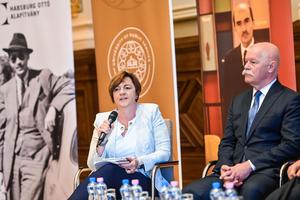The German-born American diplomat's work of global political significance was the topic of the conference entitled Values and Realpolitik - Kissinger 100th, held at the University of Public Service (UPS) on 26 May. Hungarian and foreign experts gave presentations and answered questions from the audience.
"If you follow his career, you will see that here you have the culture of a European man, the culture of a man who is aware of the lessons of European history," said Gergely Prőhle, Director of the Institute for Strategic Studies and the Otto Habsburg Foundation at the UPS, in his opening speech. He recalled that the German-born American politician warned the leaders of the old continent as early as 1973 that it was not necessarily worth strengthening European cooperation at the expense of transatlantic relations. He also spoke of the meeting where Kissinger, in front of a map of Europe, virtually sketched out what would happen in the next 20 to 30 years and how far Russia would go.
In the first part of the conference, Jérémie Gallon, director of the European division of the consultancy firm McLarty Associates, introduced the centenarian politician about whom he has written a book entitled Henry Kissinger, the European. He said that European and long-term thinking was in his genes and that he had been a US diplomat and Secretary of State. He said Kissinger was a true European realist. He also said that he believed that all his decisions should be taken in an ethical and moral way, but also in the long-term interests of America. His main goal as foreign minister was to avoid a nuclear confrontation between the Soviet Union and the United States.
Ulrich Schlie, Professor of Security Policy and Strategic Research at the University of Bonn, spoke about Henry Kissinger's career, his view of history and his political outlook. According to the lecturer, who also taught at the Gyula Andrássy University of the German Language in Budapest, there is no other living politician or scholar who could think and speak about world politics as thoroughly as Kissinger. He recalled that despite his retirement, the diplomat had been an adviser to every US president since John Fitzgerald Kennedy.
Bence Kocsev, a research fellow at the Otto Habsburg Foundation, presented the correspondence between Henry Kissinger and Otto Habsburg, which provided a rich source of information on the history of the 20th century, especially the Cold War and was the inspiration for the conference. He gave a detailed account of the 1970s, which were a formative period for both politicians. The letters also dealt with the geopolitical situation in Europe then, including relations with the United States, the Soviet Union and China.
The next panel was on China, on which Réka Szemerkényi, former Ambassador to Washington and Senior Advisor to the International Republican Institute, spoke with János Csák, Minister of Culture and Innovation, Gergl Gergl Salát, Head of the China Department at Pázmány Péter Catholic University, and Tamás Magyarics, former Ambassador to Dublin and Professor of US History and Foreign Policy.
Although the United States and China are opposing superpowers, trade relations and investment between them were at their peak in 2022," said János Csák. According to the minister, the Asian country cannot be ignored in international developments because its economy has been growing at an average annual rate of seven percent over the past two decades. He explained that German capital investment in China amounts to €95 billion, and half of Volkswagen's turnover comes from there. The South China Sea accounts for 50 percent of world trade, 33 percent of world oil trade and two-thirds of LNG trade, he said.
The two drivers of the Chinese economy are exports and domestic demand, he said, pointing out that the Chinese middle class is larger than the entire population of the European Union. He also pointed out that in 1981, 80 percent of Chinese society lived in extreme poverty, i.e. below a daily income of 1.2 dollars, but today the figure is only 0.5 percent. This means that 860 million people have moved out of extreme poverty, he added.
China faces two existential questions: how far it can maintain its identity with such rapid economic growth, and what it sees as a threat, said the minister, who said it would be inappropriate for the EU to "pull the strings" of the Chinese market under political pressure.
"Like all great statesmen, he was interested in peace, and he clearly dedicated his life and work to minimising conflicts between the great powers and avoiding wars as much as possible," Gergely Salát recalled Kissinger's political stance on China. He recalled that Sino-US relations had been developing since the early 1970s. Still, after 1989 America imposed sanctions on China; Kissinger made several trips to the Asian country because he was "trying to save damage".
"With this policy towards China, Kissinger and Nixon showed that interests came before values", emphasised Tamás Magyarics, referring to the Bismarckian principles, to which Kissinger also adhered and which set the course in Europe for a long time. This, he said, had not gone down well with the Americans.
In the second part of the conference, Géza Jeszenszky, former Foreign Minister of Hungary and former Ambassador to Washington spoke about transatlantic relations and the importance of EU membership. Finally, Janne Haaland Matlary, Deputy Foreign Minister of Norway and Professor at the University of Oslo, and Emil Brix, former Ambassador to Moscow and Director of the Vienna Diplomatic Academy, gave their views on the Russian-Ukrainian war.
Text: Zsuzsanna Szabó Réka
Photo: Dénes Szilágyi
